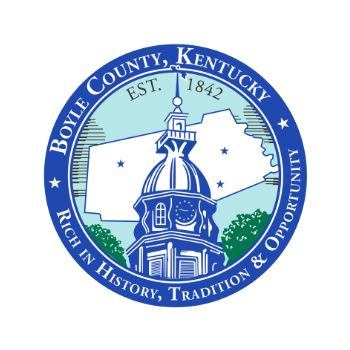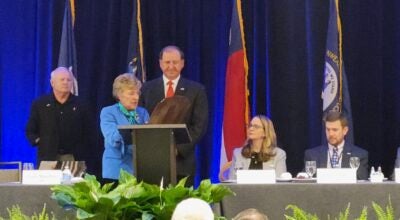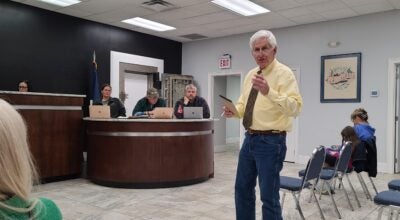Fiscal Court hears updates about EDA and EDP
Published 6:50 pm Tuesday, August 16, 2022
After roughly a year since the Danville Boyle County Economic Development Authority (EDA) was founded, members feel that they are very close to establishing its structure.
The Fiscal Court heard an update from EDA President John Roush at their meeting on August 9. He said the EDA task force is almost ready to announce its plans for the organization.
The EDA task force has been meeting every week to determine bylaws, board structure, employees, and how the organization will function. Roush said they expected to be done this September, but it is taking longer than they hoped.
The EDA board will most likely have seven members, with a possibility after two years to increase to nine. The new Economic Development Corporation (EDC), which is a restructuring of the Economic Development Partnership (EDP), will likely have the same number of board members.
Establishment of both the EDA and EDC were born out of local governments’ desire for better economic development, coupled with disappointments in the EDP’s performance.
“I’m of the opinion that we, and that would include all of us called to leadership in Danville and Boyle County, have allowed ourselves to conclude that we have been failing in the area of economic development; in fact, Danville and Boyle County have prospered in the last 20-plus years,” Roush said. “Though I am the first among us to acknowledge that we could and should do better.”
Court members cited some of their disappointments with EDP, including losing some businesses, missed opportunities, the EDP never being fully staffed, and having a board of 17 members that was too large to be efficient. Magistrate Tom Ellis said after years of attending EDP meetings, he noticed a lack of measurements, accountability, and progress.
The EDC will aim to fix structural problems with the EDP, while the EDA is mainly for commercial land acquisition that would help bring jobs to the county. Roush explained that the county needs to be able to compete with other counties whose economic development practices have gotten more intense and creative.
“We’ve had successes, but we’ve really not known how to measure those successes,” Magistrate John Caywood said.
Caywood explained that several recent years of market reports about Central Kentucky ranked Boyle County less than the top 10 of 17 Central Kentucky counties in median household income. He said this metric, along with unemployment and income growth, are some of the only concrete ways they can measure their economic development success.
Caywood made the motion that the county reach out to the City of Danville commission to have a joint meeting about future efforts of the EDA and EDC.
Magistrate Jason Cullen said he doesn’t believe the city and county get along or work well together, emphasizing the need for more collaboration. The court passed Caywood’s motion.
Danville Mayor Mike Perros was in attendance at the court’s meeting and requested to speak about the economic development issues. He disagreed with Cullen’s sentiment about not getting along.
“Any disagreements we have seem to get highlighted,” Perros said. “I think we’ve had far more cooperation than we’ve ever had before.”
Perros said he was hesitant to get the Danville Commission and Fiscal Court together to talk about the EDA and EDC, because not every official is as involved in those discussions as others, and don’t know about all the deliberations. He said the EDA/EDC discussions should be resolved by those organizations and not the commission and fiscal court.
“This court’s opinion doesn’t matter, the city commission’s opinion doesn’t matter, it rests in those two entities,” Perros said. “I don’t know if they can get there, but to me it’s those two entities that need to get in a room together, and limit public comment, and have a face-to-face discussion about disappointments, how that translates into the future.”
He said the entities need to figure out how they will fit with each other and work together.
“How does the seven-member EDA meld into some other group of well-intentioned individuals so that it remains as seven?” Perros said.
While the county is currently no longer a member of the EDP/EDC, Judge Executive Howard Hunt brought up the question of even needing the EDC. Hunt explained that he recently learned through the Kentucky League of Cities that an EDA can do everything an EDC can do.
“Although I don’t disagree with the corporation in part, it was almost a shot across the bow to a concept that I thought we already resolved through the EDA,” Hunt said.
The EDP recently hired an interim director, Terry Crowley, who will help them transition to the EDC. He said by the end of the six months he signed on for, they hope to put in place a new structure that’s more nimble, agile, and that still includes everyone.
“I would like to see us all in the same boat rowing the same direction, and I think there’s a lot of disconnects out there right now that are preventing that from happening,” Crowley said. “I think we can fix the things that aren’t working without destroying the entire situation.”
Court members agreed that they cannot move forward with past models of the EDP; and that having a solid new operating structure for both organizations will be the key in creating better economic development.
The EDP will be announcing its new bylaws and official transition to the EDC on Wednesday.







